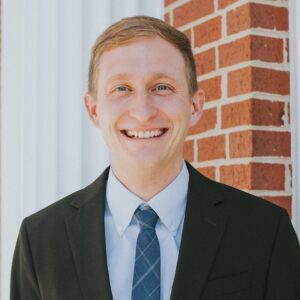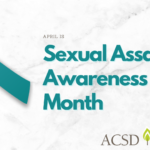A recent ACSD membership survey asked the question: what do student development professionals most need from their supervisors? Increased professional development and greater work-life balance led the way, with the third highest need being “vision casting and communicating vision.” While the top two highest needs are of critical importance, it leads one to wonder: could strong vision and good communication of that vision within a student development team result in better outcomes related to professional development and work-life balance, as well as team dynamics, fiscal stewardship, staff retention, meaningful student service, and a host of other critical student life needs?
For many student development professionals, there is a tendency to become caught up in the day-to-day responsibilities that fill our schedules. All of this work is meaningful, as our ultimate goal is to serve students and help them thrive and flourish in their educational journeys. However, becoming stuck in the minutiae of logistical processes, policies, procedures, and responsibilities can often lead to jaded feelings towards the work itself and perhaps even the institution. This distorts our work as Christian student development practitioners away from Christ-enlivened purposes.[1] Developing and communicating strong vision that is tied to both institutional and departmental mission represents a profound opportunity for student development leaders to not only avoid harmful pitfalls like those mentioned above, but also to invigorate a healthy team towards common goals and aims to the benefit of the students.
Vision Casting
Every institution of higher education has a mission statement, which describes what that institution does, for whom, and from what philosophical, ethical, social, or religious foundations they operate. Similarly, many student development departments “often have their own mission statements that reflect the larger institutional mission but also describe more specifically the work of the division related to students.”[2] While many employees can recite an institutional mission statement by heart, and many student development staff can parrot theirs, it is becoming increasingly important for student development leaders to take those mission statements and cast vision for their teams in ways that practically informs how to prioritize amongst the multiple competing demands of their work.
The vision of a student development department describes aspirational goals, priorities, and values that not only dictate focal points for the department but also should tie directly to budget needs and staff responsibilities. Taking time to develop a shared vision can lead to a greater sense of unity and understanding between team members, and ultimately, a stronger departmental culture. Solidifying vision is one major step in sustaining a healthy departmental culture and team dynamics. However, achieving shared vision is a process. As a process, vision casting can be even more salient when it is both participatory and iterative.
Participatory
Both new professionals and seasoned veterans can benefit from shared vision casting processes. Seasoned professionals can share their institutional history and knowledge in the formation and shaping of vision, both ensuring that industry best practices are included as well as key institutional values. New professionals can benefit in participating by garnering a clear understanding of both their institution’s goals, as well as their student development department’s core values and priorities. New professionals can also bring fresh ideas to the table, working alongside seasoned professionals in avoiding ruts and the ever-present “we’ve always done it this way” mentality.[3]
Participation and inclusivity from all levels of the student development team is crucial. At the same time ensuring that strong leadership guides the process and helps make firm decisions on vision for the division is also necessary. This balance allows each unique voice a chance to be heard, while also leaning on the student development leaders who have been chosen for their positions to set the tone for success. The Chief Student Development Officer (CSDO) can and should provide a grounding framework, include additional leaders in the formative early processes such as Deans, Associate Deans, and Directors, and ensure that every staff member within the organizational chart engages in vision casting.[4] Participatory processes help create a shared ownership of vision for the division and promote clear, concise expectations of individual and group responsibilities.[5]
Iterative
As an iterative process, vision casting for student development professionals should be continual and ongoing. Casting vision helps leaders create strategic goals, action steps, and ties the division’s work to mission and core values. While some components of any vision may be static, a multitude of elements are dynamic. Ongoing vision casting allows CSDO’s and their teams the ability to set clear and achievable goals and tenets for their departments that also have some fluidity. Every vision-casting process can be responsive to ever-changing student demographics, student needs, fiscal matters, personnel changes, and other institutional dynamics.[6]
Creating vision that helps student development staff understand their roles and goals in serving students gives them a chance to aim their work towards shared aims. Ensuring that the process is iterative acknowledges that the higher education landscape evolves every year. If you achieve goals as a division, change them or set new ones rather than recycling them. If one of your core strategic tenets or values no longer seems applicable to your student body, adjust it, or swap it with something new. A key reminder is to ensure vision casting is a part of your overall strategic planning and assessment processes.[7] Assessment, evaluation, and strategic planning processes will align your vision casting efforts with broader institutional goals, which focuses the work of the division on our key stakeholder: students.
Communicating Vision
Vision casting helps tie the work of student development professionals to the institutional and divisional mission statements. Participatory and iterative approaches help ensure that vision is shared and owned by team members as well as consistently evaluated and assessed. One final consideration is the need for vision to be thoroughly communicated to all stakeholders (both in and out of a given department). Casting and communicating vision can often result in a pithy, catchy vision statement. Vision statements are important messages in succinctly communication vision to stakeholders, but it is important to acknowledge that vision-casting is more than just a singular statement. Vision for a student development team includes core strategic tenets or values, ties to institutional mission and priorities, goals, action steps, assessment and evaluation, and department and individual responsibilities. Communicating the whole package, not just the vision statement, is critical.
If a CSDO has made the effort for vision-casting to be participatory, there should already be distinct understanding and buy-in from internal student development staff. However, don’t assume that every single individual has complete and clear understanding of all aspects of the vision. Larry Moneta speaks of communication for of the overall strategic planning process for student develop leaders, which involves crafting mission and vision: “Communications need to be frequent, informative, and inspirational as the process unfolds and evolves.”[8] Allowing for consistent communication of vision and goals can affect staff retention and overall buy-in to the expectations and responsibilities of any singular position. This also serves as a chance for CDSO’s and other student development leaders to invest in their employees by having regular interactions with team members sharing vision for how they will uniquely serve students at their institution.
Furthermore, communicating vision is also important with other departments within the university and with the students themselves. Ongoing communication helps all internal staff know the direction of the department, and also transparently shares with other staff and students the goals and aspirations of the student development team. Good communication can help foster a culture of shared ownership into the overall institutional mission and unified efforts and educating and serving students holistically.
Conclusion
As you and your teams work together in vision casting, here are a few suggestions:
- Pray over the process. Pray individually over your work and role, but also pray corporately for the process, the outcomes, and the ultimate goal of fulfilling mission and serving students. Regardless of whether you are at a Christian or secular institution, where do you see Christ-enlivening this process and your own work?[9]
- Develop a strong leadership team within your division to lead vision casting and communication efforts. Depending on the size of your team, this will look different for each institution. But who are the individuals in positions of respect and responsibility (both in title and in stature).
- Clearly articulate your division’s strategic tenets or values. What matters most? What specific things do you want to focus on in the coming years as key outcomes of your program?
- Tie your tenets/values to clear, achievable goals. Ensure those goals are measurable, and can be assessed and evaluated. Did you achieve a goal(s)? Don’t just copy and paste for future years; aim higher or change things up.
- Block time in your calendars to hold regular meetings on vision casting. Don’t make it a part of regular staff meetings, but be intentional about setting aside time at regular intervals.
- Communicate, communicate, communicate. Find regular and creative ways, individually and corporately, to communicate the vision of your department with both internal staff and other external stakeholders.
Dougharty, Ellis, and Gordon (2023) explain the need for student development divisions to become healthy, unified entities for the benefit of students and staff.[10] CDSO’s and other student development leaders must:
Strive to create a cohesive leadership team. The team should be strong, united, and committed to a common goal. It must establish real clarity, communicating a common purpose and vision to everyone in the organization and, at the same time, establish just enough structure to reinforce the purpose and vision going forward.[11]
Clear, participatory, and iterative vision casting is a key component of fostering a healthy student development division and retaining staff. When the division is healthy and staff are retained, students are the beneficiaries of greater attention, stronger programming, intentional support, and more meaningful discipleship and development.
References
[1] Glanzer, P. L., Cockle, T. F., Jeong, E. G., & Graber, B. N. (2020). Christ-enlivened student affairs: A guide to Christian thinking and practice in the field. ACU Press.
[2] Amey, M. J., Jessup-Anger, E. R., & Tingson-Gatuz, C. (2015). Unwritten rules: Organizational and political realities. In M. Amey and L. Reesor (Eds.), Beginning your journey: A guide for new professionals in student affairs. Washington, DC: NASPA.
[3] Amey, Jessup-Anger, & Tingson-Gatuz, 2015
[4] Moneta, L. (2021). The business of student affairs: Fundamental skills for student affairs professionals. NASPA-Student Affairs Administrators in Higher Education.
[5] Amey, Jessup-Anger, & Tingson-Gatuz, 2015
[6] Moneta, 2021
[7] Moneta, 2021
[8] Moneta, 2021
[9] Glanzer, Cockle, Jeong, and Graber, 2020
[10] Dougharty, W.H., Ellis, S., & Gordon, S.A. (2023). Create a healthy student affairs organization. Leadership Exchange, 20 (4), 28-33.
[11] Dougharty, Ellis, & Gordon, 2023.







